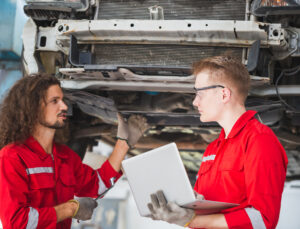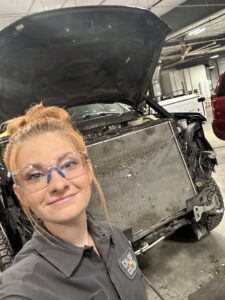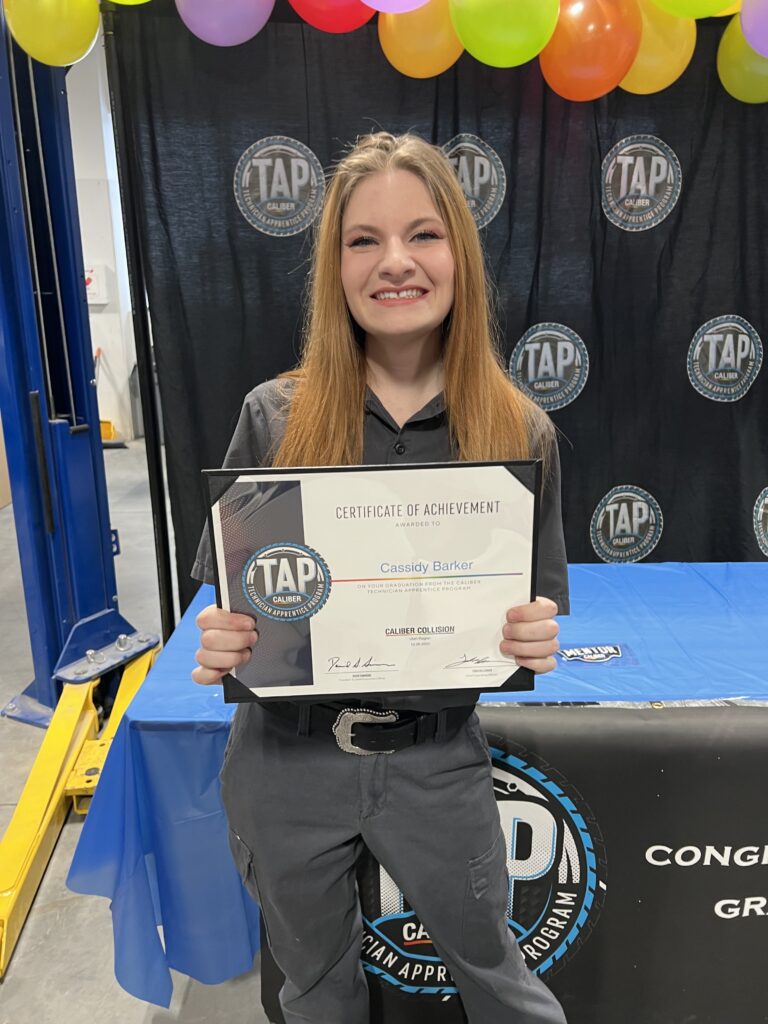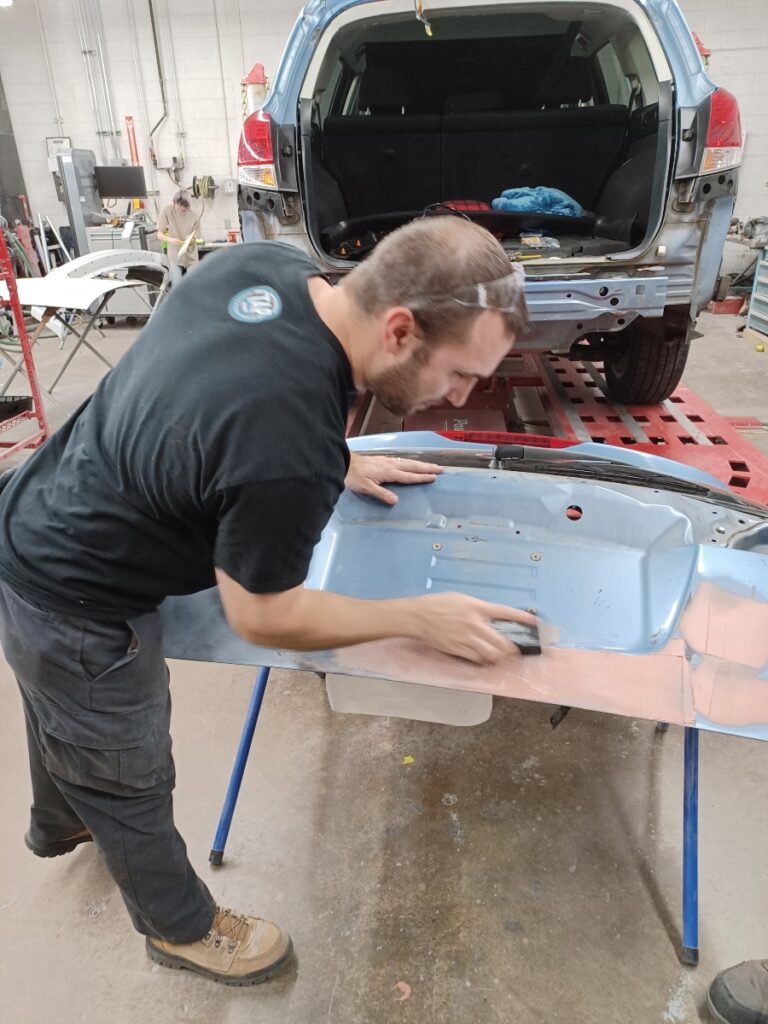
New collision repair programs find success in training next generation of techs
By onEducation
Though the collision repair technician shortage continues, more people are finding an interest in the career path and forging their way into the industry.
Recent Caliber Technician Apprenticeship Program (TAP) graduate Cassidy Barker, 22, of Utah is excited to be a new tech, working in what she believes is a rewarding job. She graduated from the program on Jan. 17.
“When you see the tail light leaving the parking lot, you’re like, ‘Man, I did that. That was all me and it looks great,” Barker said.
TAP is a competency-based and paid apprenticeship program registered with the state of Texas, according to Caliber Sustainability and Social Responsibility Senior Vice President Eddie Hightower. The first full year of TAP occurred in 2022 and 1,000 students graduated by November 2023. Participants are paid while training and receive full teammate health and retirement benefits, and time off, Hightower said.
The year-round 10- to 12-month program provides a blend of on-the-job training and I-CAR training. When each apprentice graduates, their mentors start training a new student. Participants graduate TAP as qualified entry-level Caliber technicians with three certifications, including two from I-CAR, according to Hightower.
Barker had been paying to attend a collision repair program at a local college when she decided to check out what a recently built Caliber shop near her house had to offer. That’s where she found out about and got started in TAP. She detailed cars for about two months and then started in repair work.
“It was fast and it was exciting,” Barker said of the program. “Some things were not as fun as others, but how quick they taught me compared to getting my associate’s at the college was insane — cut it in half.”
Barker has worked on cars with her Dad as a hobby since she was seven. She said she chose auto body over a desk job she had initially considered because she wanted to stay busy working in a hands-on field.
“I liked auto body because it wasn’t as dirty as mechanic work,” Barker said. “I liked being in engine bays, but I liked the artistic side of auto body — recreating something that looks totally damaged and making it beautiful again. I loved that aspect of it… I love the days where I can just go, go, go; I’ve got a busy day and I can just step into the shop, have my list of what I need to do, and just hammer it out. I love being able to move and get stuff done… the multitasking of [jobs] is my favorite.”
She quickly realized and still appreciates the importance of OEM repair procedures, which she has found give step-by-step guidance down to the smallest details of repairs, she said.
“I’ve seen the cars where people just throw them together to make them look good on the outside, but you take a bumper off and it’s insanely scary how people let things fly,” Barker said. “If I knew I was driving this, I’d flip my top off.”
The most challenging part of TAP for Barker was getting over the mental hurdle of feeling too overwhelmed or intimidated to complete the tasks at hand.
“For me, it was, ‘OK, I’m not going to look at it as a huge picture. I need to look at it step by step and I’m not going to look at the next step until I’m completely done with the step I’m doing right now.’ …if you break it down, it was a lot simpler and not as overwhelming. Changing my mindset like that was hard for me.”
Advice and support from her manager helped a lot, too. To those interested in getting into the industry, she says go for it and especially encourages women to become technicians.
“If you start out strong and you kind of taper off — if you get comfortable in this career — you’re not going to last,” Barker said. “You’re always getting a car that’s going to throw a curveball at you… so hit the ground running and keep running. If you can’t handle fast-paced, then I’d be a little worried.
“I don’t think women should be scared to jump into a career where it’s male-dominated. It’s intimidating for sure, but if you’ve got thick skin and you’ve got the drive to do it, then go do it. I believe 100% girls can do this. It’s hard when you are the only girl out there because you feel like you’re outnumbered; you feel like you can’t do it because you’re not as muscly or as tough as the dudes, but you can do it. You’ve just got to get creative. Sometimes you’ve got to use tools to your advantage. It’s not a bad thing to ask for help either.”
The reward is seeing each job through, Barker added.
Technician safety while working on vehicles, and for passengers if they’re involved in another collision, is important to keep in mind as well, she said.
“[Repair] standards are important,” Barker said. “I don’t ever want to have to deal with a situation where someone comes back and they’re like, ‘I wrecked my car again and it did not hold up like it was supposed to.’ Because that’s on me and that’s going to be a big issue that I don’t want to ever have to deal with. I’m very particular when I put my cars back together to make sure they are 100% going to be safe when they get back in their car.”
Safety is also Gabriel Carrasco’s No. 1 priority. He’s been a TAP mentor at a California Caliber shop for about three years. He’s currently teaching three students.
“I like to introduce them to safety, first and foremost,” he said. “Repairing bumpers is probably one of the biggest things… I like to teach them how to at least be efficient with bumpers… that’s where a lot of the money is to make money off repairs.”
Carrasco said he makes sure he instills confidence in his apprentices.
“I try not to be over their shoulder all the time… let them know what it is to earn that accomplishment,” he said. “Whether it’s removing a panel, disassembling something, or finishing some Bondo — just letting them go as far as they can and walking them through. Letting them do their own procedure because I don’t like to take their glory away.”
Carrasco teaches his apprentices how to stay organized, disassemble vehicles, identify and correct damage, correct body lines, replace quarter panels or rear bodies, and set up and use a frame machine.
“They look at the collision of the car and they get very intimidated and once we start breaking down the panels per panel and do one repair or a replacement, they get to see that it’s not as bad as it seems,” he said. “Once they start getting more in-depth to the repairs and get familiar with manipulating metals, they create more confidence.
“That’s something that I never had before in my field when I was an apprentice so it feels good to be there for someone. I remember that time when I was struggling. There’s always bad apples in certain shops and I kind of had a little bit of that. I just want to make sure that the next generation doesn’t go through that.”
The learning process requires patience for not only the students but the instructors as well, he added.
Some students want to immediately work for commission but Carrasco said he lets them keep track of their own hours while they’re paid hourly so they can “eat their humble pie and start from the beginning and earn their way up.”
Current TAP participant Landon Coffey, 35, of Tennessee has taken a slightly different route in completing the program than Barker. After completing a year at the technical college, Caliber offers TAP to students as a co-op with their last year of study, Coffey said.
Coffey grew up around automotive mechanical and body work at shops his father and grandfather owned. After serving in the military and working several other automotive-related jobs, Coffey settled on auto body as his career choice. He’ll graduate from TAP in March.
“The finished product is really satisfying,” he said. “It allows me to work with my hands. It’s elite because there’s not a whole lot of people really that can do it and do it correctly, and I love that. I’m learning how to do it the right way and how to be most successful at it. It just kind of comes second nature to me. My Dad is a mechanic. My Grandpa was a body guy.”
Working in a shop as an apprentice has shown Coffey firsthand the structure of shop workflow and that, fundamentally, most cars are structurally the same, making learning easier over time, he said.
“I learned there’s so much more as far as paperwork, keeping up with your parts, keeping up with deadlines, and also doing all that bearing in mind the time and putting out quality work,” Coffey said. “There’s only so much that a little bit of exposure at a college can teach you. the TAP program is really good at filling those gaps.”
He added that working in auto body is a great fit for people that love hands-on work and arts and crafts because it’s the artistic side of automotive work.
After participants graduate, TAP follows along with them for about the next six months to make sure that they’re working up to Caliber quality standards and delivering safe repairs, Hightower said.
TAP is available at nearly 70% of Caliber’s locations with 2,000 participants in the program as of December. The goal is to graduate 2,000 techs per year, Hightower said.
“We need technicians and I look at it as a real pocketbook item for everybody because our lack of technicians is driving up repair costs [and] repair time,” Hightower said. “We’re really augmenting I think, all the technical schools, which we view as partners, and every other training program that’s out there. We’re really playing our part in doing this and solving the technician shortage.”
TAP isn’t currently open to those looking to train and be hired at shops outside of Caliber.
One way many in the industry have said will help solve the technician shortage is to reach potential students in high school, and preferably even younger.
An example of a fairly new program reaching out to high schoolers is in Maine. Caribou Technology Center’s career and technical education (CTE) exploratory program became available to all high school students in 2021. Preference is given to freshmen and sophomores. Classes are offered in auto body, auto technician, agriculture, welding, residential construction, and large equipment repair and maintenance classes.
“The purpose of this program is two-fold,” the center states on its website. “First, we want to introduce students to as many blue-collar careers as possible so that they can decide which they enjoy most before investing more time. Second, we want to provide students introductory knowledge in all of the basic trade skills that would benefit them as future home and auto owners.”
However, a newly formed state task force says students need more access to CTE statewide and is considering creating a statewide program that would include a residential four-year CTE school in the Brunswick and Bath area, according to The County.
The task force has reviewed CTE programs in Massachusetts and New York to get ideas on how to build one in Maine.
A bill signed into law in June requires school districts, beginning June 30, 2025, that operate CTE programs to provide an equivalency agreement for credit gained to be accepted as core credit toward a high school diploma.
In the fall of 2023, two students became the first to graduate with degrees from Texas State Technical College’s new Auto Collision and Management Technology specialization, according to the Jacksonville Progress.
Bryam Herrera, of Rosebud, and Carlos Rincon, of Jacksonville, Texas, received Associate of Applied Science degrees in Auto Collision and Management Tech–Repair Specialization Co-op, according to the article. A refinishing specialization is also offered. Hands-on training is provided in class and through an internship at a body shop. Instructors are I-CAR-certified and Automotive Service Excellence Education Foundation (ASE)-certified.
The degree is affiliated with the Collision Engineering Program (CEP), created by Enterprise Holdings and Ranken Technical College. Six other colleges that offer the CEP are located in California, Illinois, Nebraska, Missouri, and Texas.
In November, Tiffany Silva, owner of Accurate Auto Body in Richmond, California and a Corner Foster College Advisory Board member, said CEP is the answer to the lack of technicians that the industry has complained about for years and taken no action on.
“Collision Engineering is a solution we’ve all been looking for,” she said. “It is a model that is such a breath of fresh air in our shops, bringing these technicians in that are learning from our industry. They are being taught. It’s not like in the past where it was bondo on old fenders and some primer. They are being taught by our industry leaders out here… when they come into our shop, they are so excited to be there.”
Images
Featured image: Stock photo of technicians working together in a shop. (Credit: justocker/iStock)
Cassidy Baker takes a selfie while working on a vehicle in a Caliber Collision shop in Utah. (Provided by Cassidy Baker)
Landon Coffey works in a shop in Tennessee. (Provided by Landon Coffey)
More information
TechForce: Amount of students graduating from tech schools is increasing


